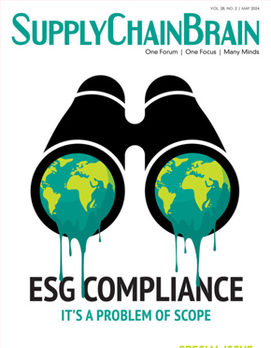
Trade was blamed for the supposed dismantling of the nation's manufacturing base, along with the woes that have beset large swaths of the American working class. Hard to believe that the engine behind so much economic growth the world over had become political poison for both major parties.
Even with the election now behind us, issues such as the Trans-Pacific Partnership (TPP) will continue to generate heated controversy, as Congress decides whether to ratify it. At the same time, other voices could re-emerge to spark a more reasoned debate over the value of trade.
But regardless of public sentiment over the issue – and a gnawing sense that trade's momentum is slowing if not beginning to reverse – companies can't ignore the need to look beyond their borders for new sources of business in the maturing 21st Century. And to make that dream a reality, trading nations will need to step up their efforts to smooth the path to global commerce.
One potential roadblock concerns the fastest-growing sector of consumer-oriented business, e-commerce. Today, online orders sourced domestically are rushed to the buyer with few if any logistical or regulatory obstacles. Not so with those that cross borders. Many countries are grappling with the question of how to treat incoming e-commerce orders, which tend to move in huge quantities of small packages that demand expedited treatment.
This flood of random shipments is "raising the eyebrows of some customs authorities concerned with what’s coming in," says Eugene Laney, head of international trade affairs with DHL Express. The lack of harmonized practices among trading partners for clearing such packages threatens to hamper the growth of e-commerce the world round. Add in a slew of confusing trade laws and fickle customs procedures, and you have the potential for a serious slowdown in international shipping.
Such worries are borne out by a recent survey of DHL customers, half of whom said that diverse trade laws and customs documentation requirements were a "major hurdle" blocking efforts to grow their international business. But there's good news as well, in the form of a move by countries to streamline customs procedures, and take down some of the more egregious obstacles to trade.
Chief among those efforts is the World Trade Organization's Trade Facilitation Agreement. Currently in the process of being ratified by WTO members (and still short of the two-thirds mark for approval), the TFA seeks to expedite the movement, release and clearance of goods crossing borders. It also lays the groundwork for cooperation among customs authorities, with the goal of standardizing compliance measures and facilitating trade.
“We’re delighted that countries are coming together,” says Laney, stressing that ratification of the TFA will give a big boost to companies doing business in multiple regions of the world. The agreement should be of particular value to e-commerce, which remains in the early stages of development in many countries.
In the meantime, there are steps e-commerce shippers can take to heighten the chances that their goods will reach international markets expeditiously. DHL has been working to educate small and medium-sized businesses about rules on what can be legally shipped, by whom, and to where. It’s urging shippers to avoid use of the word “gift” on packages, and be more specific about what’s in the box. For some customs authorities, that word raises an immediate red flag, says Laney.
What DHL and other package movers would like to see is a world where regular e-commerce merchandisers become “trusted shippers” in the eyes of customs officials, and where the shipments of those entities can be consolidated for expedited treatment. At the same time, governments aren’t likely to relax their efforts to intercept counterfeit goods, which can pose serious security and health risks to the end user. Even with the help of TFA, regulators will need to strike a balance between oversight and trade facilitation.
One particular aspect of TFA promises to have an especially favorable impact on traders. It’s the “Single Window,” a means of submitting trade documents required by multiple regulatory agencies through a single portal. It has to be implemented on a country-by-country basis; President Obama launched the U.S. version, covering some 43 separate agencies, by executive order in 2015. It’s due to become a reality here by the end of this year.
TFA also contains a requirement that countries publish their rules on the cross-border movement of goods, thereby eliminating the confusion caused by a lack of transparency. Laney says DHL is further heartened by an increase this year in the value of commercial merchandise that can enter the country without paying taxes or duties, from $200 to $800 per shipment. “That’s a huge change for e-commerce companies,” he says.
Anti-trade rhetoric notwithstanding, Laney believes TPP will eventually be ratified by the U.S., albeit with the revision or elimination of some of its more controversial language through side agreements. With the presidential election finally out of the way, perhaps trade can regain at least some of the luster that it lost in the heat of politics.



.jpg?height=100&t=1715228265&width=150)



